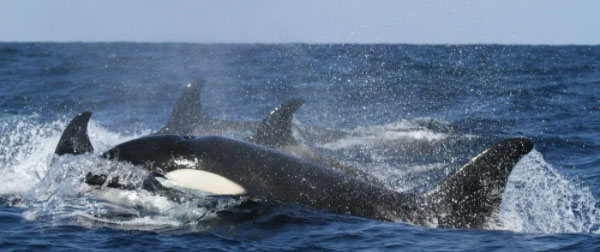||| FROM BUSINESS INSIDER |||
The sounds of a “chatty” killer whale have been recorded in South Africa for the first time, off Fish Hoek in False Bay on Tuesday.
The sounds were captured by researchers Tess Gridley and Simon Elwen from Sea Search, a non-profit based in Muizenberg that focuses on research and conservation of marine mammals along the coasts of South Africa and Namibia. The pair were tipped off by local whale watchers.
“We have a local sightings group which is a bunch of keen whale watchers and operators. Somebody reported early in the morning that there was a killer whale in the False Bay area at around eight o’clock,” said Elwen.
“Dave Hurwitz, who runs the Simon’s Town Boat Company, a whale watching company, had his boat on the water and is part of a consortium that are all together trying to learn more about the animals and gave me a ring. I grabbed the equipment and ran out the door, luckily all our batteries were charged and managed to make it from Muizenberg to Simon’s Town in about 40 minutes.”
Sea Search has been coordinating acoustic and biopsy research into killer whales for the last two years, working in collaboration with the University of Pretoria as well as Durham University in the United Kingdom.
“It was a male with an erect normal upright dorsal fin. We probably have it in the catalogue, and Hurwitz thought he recognised it from previous boat trips,” said Elwen. “It was quite unusual behaviour [to see]. Usually when killer whales are in the False Bay they tend to keep moving. It was very unusual to see they were staying in one area. The way it behaved we presumable [sic] it was probably feeding on something in the bottom – probably some reef associated fish or a ray or something like that.”
Listen to this:
“This is the first documentation of orca vocalisations we think in South African waters. In general, killer whales are known for having a shared dialect. So, in groups they share a repertoire of call types,” said Gridley.
“As you can hear from the short clips we put up on our YouTube channel they can sound quite odd. The sound like little bursts and squeaks and whistles. We’re really at the beginning of our research of killer whales in South Africa and vocalisations. Which is why we are excited to get this data.”
The audio is important because you can identify different ecotypes from the calls that killer whales make.
READ FULL ARTICLE: www.businessinsider.co.za/the-first-acoustic-recordings-of-killer-whales-were-caught-in-south-africa-from-a-chatty-male-in-false-bay-2021-1
**If you are reading theOrcasonian for free, thank your fellow islanders. If you would like to support theOrcasonian CLICK HERE to set your modestly-priced, voluntary subscription. Otherwise, no worries; we’re happy to share with you.**








